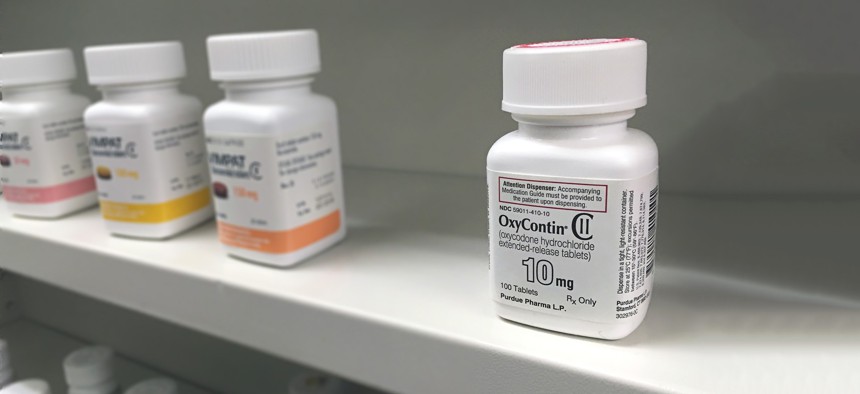State AGs Urge Insurers to Incentivize Non-Opioid Treatments

An Oxycontin bottle on a shelf in a pharmacy. Shutterstock.com / PureRadiancePhoto

Connecting state and local government leaders
The attorneys general argue in a letter that health insurers are in a position to “make a very positive impact” in the way that providers treat patients with chronic pain.
Attorneys general from states around the U.S. pressed the nation’s health insurers Monday to take steps to help curb the amount of opioid drugs that doctors and others prescribe.
The chief state legal officers are pushing for insurers to review, and potentially revise, payment and coverage policies to encourage health care providers to prioritize non-opioid pain management over opioid drugs for the treatment of chronic pain not caused by cancer.
In a letter to an industry trade group, America’s Health Insurance Plans, the attorneys general point out that although the amount of pain reported by Americans has remained steady since 1999, prescriptions for opioid painkillers since then have nearly quadrupled.
“This four-fold increase in prescriptions has contributed to a commensurate increase in the number of opioid overdose deaths,” the letter says.
Attorneys general from 35 states, the District of Columbia and Puerto Rico signed the letter.
They make a case that insurers just asking health care providers to consider offering alternative treatments is not enough and that there needs to be a supporting incentive structure in place.
“All else being equal, providers will often favor those treatment options that are most likely to be compensated, either by the government, an insurance provider, or a patient paying out-of-pocket,” the attorneys general wrote. “Insurance companies thus are in a position to make a very positive impact in the way that providers treat patients with chronic pain."
Cathryn Donaldson, a spokesperson for America’s Health Insurance Plans said in an email that the industry is committed to solving the widespread problems with opioid abuse currently plaguing the U.S.
“Many health plans have instituted new programs that are helping to dramatically reduce how much—and how often—opioids are prescribed,” she said.
The attorneys general say in their letter that opioid overdoses kill 91 Americans every day and that more than half of those deaths involve prescription drugs.
There are financial consequences as well. Opioid addiction costs the U.S. economy an estimated $78.5 billion annually, according to the letter, and state and local governments spend nearly $8 billion a year on criminal justice expenses tied to the abuse of the drugs.
The letter cites research that suggests prescribing opioids over long periods of time for pain relief can be ineffective and dangerous. And it mentions non-opioid medications, physical therapy, acupuncture, massage and chiropractic care as alternatives to opioid painkillers.
“Reducing the frequency with which opioids are prescribed will not leave patients without effective pain management options,” the attorneys general wrote.
Donaldson said in her email that recent research has shown that non-opioid drugs, and even over-the-counter medication like ibuprofen, can provide just as much relief as opioids.
Bill Lucia is a Senior Reporter for Government Executive’s Route Fifty and is based in Washington, D.C.

NEXT STORY: Zinke Plan Would Reduce Size of 6 National Monuments





